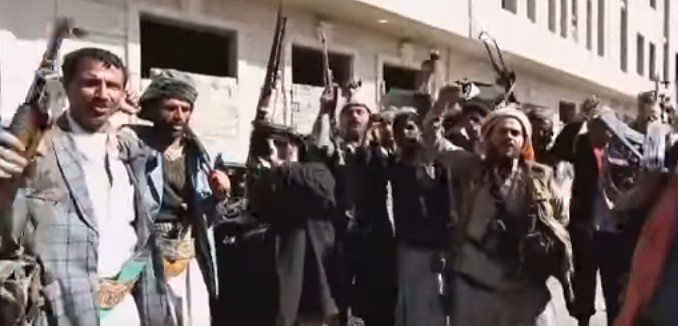The All Party Parliamentary Group on Yemen in the British Parliament on Wednesday released their annual report on the situation in the war-stricken country, warning, for the first time, of “Iran’s hand in the civil war (…) and its attempt to project power on the Arabian Peninsula.”
The APPG observed that, “Cooperation with non-state actors is an integral part of Iran’s foreign policy through which the Islamic Republic seeks to consolidate power across a region dominated by Sunni Islam.” As examples of this strategy, the group named Iran’s support for the Lebanese-based terrorist organization Hezbollah, as well as Iranian militia in Syria and Iraq.
The parliamentary group further noted that “Iran’s stance against the war must be judged in the context of their desire to undermine Western and Saudi influence in Yemen” and warned that Tehran’s arming of the Houthi rebels has led to a “major escalation” in the conflict.
The report references several “illicit arms shipments from Iran to Yemen” – which included the transfer of thousands of AK-47 rifles, 100-rocket propelled grenades, and dozens of PKM general purpose machine guns – that had been intercepted by international patrols, in violation of United Nations Security Council Resolutions.
Based on their findings, the APPG observed that Iran changed its route through which it ships weapons to Yemen “Recently, it emerged that the Islamic Republic’s Revolutionary Guard Corps is shipping arms to Houthi rebels through a new route across the Gulf (…) over the last six months, Iranian shipments have taken place in Kuwaiti waters to avoid international patrols.”
The APPG charged that Iran is in non-compliance with paragraph 14 of UNSCR 2216, after a U.N. expert panel “in January 2018 identified missile remnants, related military equipment and military unmanned aerial vehicles that are of Iranian origin and were brought into Yemen after the imposition of the targeted arms embargo.”
United States Ambassador to the United Nations Nikki Haley has pointed out that the Iran’s transfer of weapons to the Houthis also violates UNSCR 2231, which implemented the nuclear deal and maintains bans of Iran’s export of weapons.
The Houthis have used the game-changing equipment shipped to them from Iran to attack the international Saudi-led coalition. In November 2017, Houthi rebels fired at Riyadh Airport, leading to the tightening of the blockade of Yemen’s ports, and therefore to the worsening of the already alarming humanitarian situation in the country.
Over the cause of this year, the Houthis have escalated their campaign against Saudi Arabia. In March 2018, a Houthi missile attack on Riyadh killed one Saudi citizen; in April two ballistic missiles were launched at the Saudi city of Najran and two short-range Badr 1 ballistic missiles at the Saudi ARAMCO facility in Jizan city. The report noted that “UAE military positions have also been targeted in Mokha in Yemen, with two of these missiles being intercepted on 15 April.”
The APPG report, in line with UK government policy, reaffirms Saudi Arabia’s right to self-defense against Houthi attacks, and recommends that the international community is “working to ensure that Iran cannot exert undue influence in Yemen.”
[Photo: euronews (in English) / YouTube]




